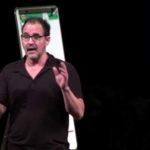We run our website the way we wished the whole internet worked: we provide high quality original content with no ads. We are funded solely by your direct support. Please consider supporting this project.

Will Violence against ISIS Root Out Evil?
Image by arbyreed via Flickr
Fallen humans tend to identify their own group as righteous and any group that opposes them as evil. If they were not evil, we tend to believe, no conflict would exist. Hence, the only way to end the conflict is to rid the world of this evil. This is the age-old “myth of redemptive violence.”
The true cause of violence, of course, is not “the enemy” but something much more fundamental, something both we and the enemy have in common. The true cause lies in the fact that our fallen hearts are idolatrous and subject to the fallen powers that influence us.
So long as people locate their worth, significance, and security in their power, possessions, traditions, reputations, religious behaviors, tribe, and nation rather than in a relationship with their Creator, a violent tit-for-tat game is inevitable. Of course, peaceful solutions must still be sought and can, to some degree, be attained with regard to each particular conflict. But as long as humans define their personal and tribal self-interests over and against other people’s competing personal and tribal interests, violence is inevitable and will break out again.
History is filled with people who believed that this or that war would root out evil once and for all and bring about lasting peace. The myth has been especially strong in American history. We, the righteous nation, will root out all evil. Any peace achieved by violence is a peace forever threatened by violence, thus ensuring that the bloody game will be perpetuated.
The hope of the world lies in a kingdom that is not of this world, a kingdom that doesn’t participate in perpetuation of the bloody game, a kingdom that operates with a completely different understanding of power. The unique nature of this kingdom is revealed in a discussion Jesus had with some of his disciples when they asked who would be the greatest in the kingdom. Jesus responded:
The kings of the Gentiles lord over them; and those in authority over them are called benefactors. But not so with you; rather the greatest among you must become like the youngest, and the leader like one who serves. For who is greater, the one who is at the table or the one who serves? Is it not the one at the table? But I am among you as one who serves. (Lk 23:25-27)
Jesus identified the disciples’ argument as a typical kingdom-of-the-world conflict—and thoroughly pagan. This is the way worldly rulers—and the world in general—naturally think. Indeed, it is a matter of common sense by the world’s standards. Naturally the older is greater than the younger, the leader worthy of higher esteem than the follower, the one who sits at the table greater than the one who serves. Yet Jesus not only rejects this “common sense” logic—he reverses it! Jesus, the Son of God, the one who is greatest by any standard, came to earth not to be served but to serve others, and the kingdom he came to establish would be marked by this distinctive feature.
—Adapted from The Myth of a Christian Nation, pages 26-28
Category: General
Tags: Evil, Myth of a Christian Nation, Non-Violence, Upside-Down Kingdom, Violence, War
Topics: Following Jesus
Related Reading

Responding to Critics of a Pacifist View of the Syrian Crisis-Part 2
United Nations Photo via Compfight Yesterday I posted a response to Tyler Tully’s criticism of some of my thoughts on the Syrian crisis. The second blog I’d like to review is Two Friars and a Fool by Aric Clark. Like Tully, Aric approved of much of what I said, but also like Tully, he raised several…

Black Lives Matter, the Police, and Spiritual Warfare
Christ calls us to stand for a different kind of kingdom and this requires that we think in different ways about the violence that is gripping our country. In this short clip from Greg’s sermon this last weekend, we are introduced to a different way. Listen and hear the challenge to understand the deeper reality…

Should churches have armed security guards?
Question: Recently (December, 2007) a security guard at New Life Church in Colorado Springs shot and apparently killed a man who was shooting people in the church parking lot. The pastor (Brady Boyd) hailed her as a “real hero.” Do you think churches should have armed security guards and do you think the pastor was…

Podcast: What is Violence?
Greg takes a closer look at what violence is. Then he bullies Dan. http://traffic.libsyn.com/askgregboyd/Episode_0174.mp3

Greg’s Response to Driscoll’s “Is God a Pacifist” Part III
This is the last of a three-part response to Mark Driscoll’s post, “Is God a Pacifist?” We’ve seen that, to prove that Jesus was not “a pansy or a pacifist” (meaning that Jesus was okay with justified killing), Mark Driscoll skips over what Jesus actually taught and modeled in the Gospels and instead appeals to…

Violent Parables?
Some try to argue that Jesus did not make loving enemies and refraining from violence an absolute mandate. They make their case on the basis of several passages from the Gospels. The first concerns the cleansing of the temple which we addressed here, while the second is about how Jesus spoke harsh words to the…
